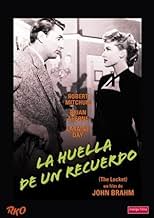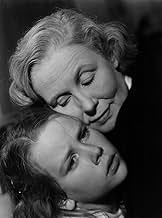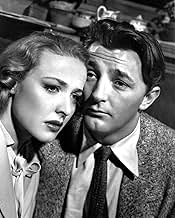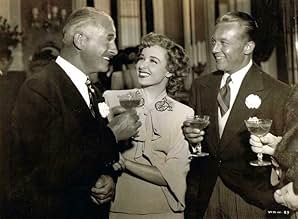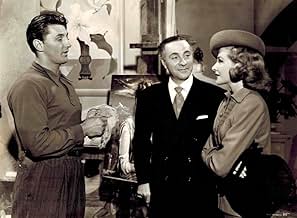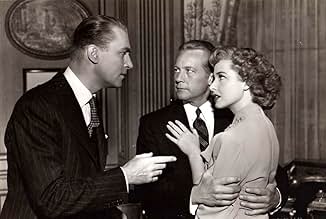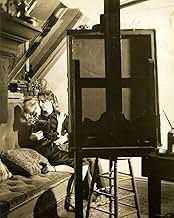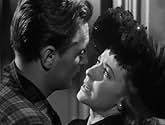PUNTUACIÓN EN IMDb
7,1/10
3,4 mil
TU PUNTUACIÓN
Justo antes de su boda, el novio escucha una compleja historia que pinta a su encantadora novia como diabólica y desequilibrada.Justo antes de su boda, el novio escucha una compleja historia que pinta a su encantadora novia como diabólica y desequilibrada.Justo antes de su boda, el novio escucha una compleja historia que pinta a su encantadora novia como diabólica y desequilibrada.
- Dirección
- Guión
- Reparto principal
- Premios
- 4 premios en total
Helene Thimig
- Mrs. Monks
- (as Helen Thimig)
Mari Aldon
- Mary
- (sin acreditar)
Polly Bailey
- The Cook
- (sin acreditar)
Reseñas destacadas
This is a great movie! I wasn't expecting to like it but boy, was I in for a suprise. The flashback within a flashback within a flashback (Is there another one?) theme is so great and is never the least bit confusing. Laraine Day, Brian Aherne, Robert Mithchum, and Gene Raymond give great performances in this thriller.
Yes! This is the movie that does just that - but it's worth watching for more than that. It is an inspired piece of film-making with excellent direction and fine photography. It also features some strong performances especially from the (is she or isn't she evil) Laraine Day, and the wonderful Brian Aherne. And Robert Mitchum's pretty good too. The best bits are almost expressionist - especially the music box shots - and it's full of the pseudo psychological nonsense that Hollywood loved so much in this era. Highly enjoyable.
The Locket (1946)
Well, when you have a post-war movie with Robert Mitchum at his young prime, you can't go wrong.
The star (or starlet, as they used to say) is actress Laraine Day playing Nancy, and she pulls off a charming, attentive, smart perfect woman. A bride to be, in fact. The movie starts with people arrive to a high class wedding. Mitchum shows up via flashback (classic film noir stuff). In fact, there is a flashback within a flashback within a flashback (4 levels) and it's sort of fun.
There are some great lines like, "If you'e lucky you can afford to be nice." But some of the dialog, and maybe the plot overall, is a hair stiff at times.
Director John Brahm is not well known, but his "Hangover Square" the year before is really great. And this one shows a consistent sense of storytelling and drama with highs and lows if not always fully developed characters. The key character is Nancy, who uses her charm to win over the audience as well as the men around her in the plot. Day plays her role perfectly—swiveling sweetness against a just perceptible insincerity. She's a terrific liar.
Which brings me back to Mitchum, who is good but seems to be reading rehearsed lines too often. I think there was supposed to be chemistry between Day and Mitchum, but it wasn't there, even though they both look terribly good.
Though it has a noir-like flavor, this strikes me as a straight up melodrama overall, and with soaring music and lots of dramatic lighting there is no way to not get absorbed in it. There are some short but well done scenes of London during the war (bombs and blackouts).
A well done and lesser known good one. And a fun curiosity—the crazed music box music that denotes an uneven state of mind is the same as that used in the "Bad Seed."
Well, when you have a post-war movie with Robert Mitchum at his young prime, you can't go wrong.
The star (or starlet, as they used to say) is actress Laraine Day playing Nancy, and she pulls off a charming, attentive, smart perfect woman. A bride to be, in fact. The movie starts with people arrive to a high class wedding. Mitchum shows up via flashback (classic film noir stuff). In fact, there is a flashback within a flashback within a flashback (4 levels) and it's sort of fun.
There are some great lines like, "If you'e lucky you can afford to be nice." But some of the dialog, and maybe the plot overall, is a hair stiff at times.
Director John Brahm is not well known, but his "Hangover Square" the year before is really great. And this one shows a consistent sense of storytelling and drama with highs and lows if not always fully developed characters. The key character is Nancy, who uses her charm to win over the audience as well as the men around her in the plot. Day plays her role perfectly—swiveling sweetness against a just perceptible insincerity. She's a terrific liar.
Which brings me back to Mitchum, who is good but seems to be reading rehearsed lines too often. I think there was supposed to be chemistry between Day and Mitchum, but it wasn't there, even though they both look terribly good.
Though it has a noir-like flavor, this strikes me as a straight up melodrama overall, and with soaring music and lots of dramatic lighting there is no way to not get absorbed in it. There are some short but well done scenes of London during the war (bombs and blackouts).
A well done and lesser known good one. And a fun curiosity—the crazed music box music that denotes an uneven state of mind is the same as that used in the "Bad Seed."
Brahm's intricately constructed film is based on the obvious conceit of a locket: in psychoanalytical terms, it symbolises repressed memory and of the 'opening up' of hidden psychosis. In a filmic sense of course, The Locket itself is a cinematic 'locket', the flashbacks within flashback structure reflecting the secret enclosure typical of such a piece of jewellery.
In fact I can't think of another film that takes this much commented narrative technique to such extremes. Mitchum of course was well used to playing heros faced with abnormal feminine psychology. He faces similar femme fatales in Preminger's 'Angel Face' for instance and in Farrow's 'Where Danger Lives' - all made at around the same time (end 40's, start of 50's). This may reflect something of the obsession that Hollywood had with cod Freudianism just as much as noir convention, but there is no doubting that Mitchum's peculiar manner as an actor, his doe-eyed sleep-walking acting style, made his starring excursions into the dangers of the subconscious peculiarly effective.
Brahm, one of Hollywoods most neglected directors at least for the work that he did at this time in his career, makes the somewhat over- stretched structure of the film work, pun intended, like a dream. Nancy's final walk to the altar, immediately before her mental and psychic collapse, although necessarily melodramatic, is very effective version of a personal calvary and she seems stunned and trance like. In retrospect, of course, it is easy to see how the whole of the preceding film has been leading up to this sequence, (just as how the flashback structure of the film reminds one in passing of 'Citizen Kane') but the sound and vision montage is still powerful.
By setting the bulk of the film in flashback, Brahm places it in the past - or, more precisely, in the imaginatively reconstructed past, and it is this dream-sense that retains a powerful grip on the viewer as events unfold. This almost hallucinatory sense, together with a feeling of 'drifting with fate', marks out some of the greatest noirs and B-mysteries made at this time and is what makes this film still very watchable today.
A 'Locket' well worth looking into.
In fact I can't think of another film that takes this much commented narrative technique to such extremes. Mitchum of course was well used to playing heros faced with abnormal feminine psychology. He faces similar femme fatales in Preminger's 'Angel Face' for instance and in Farrow's 'Where Danger Lives' - all made at around the same time (end 40's, start of 50's). This may reflect something of the obsession that Hollywood had with cod Freudianism just as much as noir convention, but there is no doubting that Mitchum's peculiar manner as an actor, his doe-eyed sleep-walking acting style, made his starring excursions into the dangers of the subconscious peculiarly effective.
Brahm, one of Hollywoods most neglected directors at least for the work that he did at this time in his career, makes the somewhat over- stretched structure of the film work, pun intended, like a dream. Nancy's final walk to the altar, immediately before her mental and psychic collapse, although necessarily melodramatic, is very effective version of a personal calvary and she seems stunned and trance like. In retrospect, of course, it is easy to see how the whole of the preceding film has been leading up to this sequence, (just as how the flashback structure of the film reminds one in passing of 'Citizen Kane') but the sound and vision montage is still powerful.
By setting the bulk of the film in flashback, Brahm places it in the past - or, more precisely, in the imaginatively reconstructed past, and it is this dream-sense that retains a powerful grip on the viewer as events unfold. This almost hallucinatory sense, together with a feeling of 'drifting with fate', marks out some of the greatest noirs and B-mysteries made at this time and is what makes this film still very watchable today.
A 'Locket' well worth looking into.
This film by underrated director John Brahm is one of the more interesting works of the 1940s (not one of the best, but different).
Laraine Day plays Nancy, about to marry and hiding some dark secrets in her past. She was excellent at this kind of thing. Gene Raymond (not the most charismatic of actors but surprisingly good here) plays her intended, with Brian Aherne as the psychiatrist who knows about her previous life.
In flashback we see Nancy and her husband (a young Robert Mitchum) and then into another flashback (daring to attempt this at the time when many films were still pursuing conventional structure).
'The Locket' of the title obviously holds the key to the mystery, and we have an absorbing time pulling all the loose ends together. Reginald Denny, Ricardo Cortez, and Ellen Corby decorate an accomplished cast.
Laraine Day plays Nancy, about to marry and hiding some dark secrets in her past. She was excellent at this kind of thing. Gene Raymond (not the most charismatic of actors but surprisingly good here) plays her intended, with Brian Aherne as the psychiatrist who knows about her previous life.
In flashback we see Nancy and her husband (a young Robert Mitchum) and then into another flashback (daring to attempt this at the time when many films were still pursuing conventional structure).
'The Locket' of the title obviously holds the key to the mystery, and we have an absorbing time pulling all the loose ends together. Reginald Denny, Ricardo Cortez, and Ellen Corby decorate an accomplished cast.
¿Sabías que...?
- CuriosidadesNorma Barzman's lengthy treatment for this film, which Sheridan Gibney revised into a screenplay, was inspired by a true event which was recounted to her by financier George Peabody Gardner and his sister Belle. When younger, the Gardners eschewed their aristocratic upbringing partly in reaction to an incident in their youth: As children they became friendly with the daughter of the family's housekeeper. It transpired that the daughter was wrongly accused of stealing a locket, leading to the firing and departure of the housekeeper and her daughter. Years later, they learned that the daughter suffered from depression and was implicated in a theft, a consequence for which the Gardners felt their family was partly responsible.
- PifiasAmerican ambulances, shown driven with left-hand drive, were not used in wartime London.
- Citas
Norman Clyde: I don't take money for nothing. I'm not conducting a class so the parasitic rich can escape boredom. I'm not that hard up.
Nancy Patton: Well, I hope you never will be, Mr. Clyde. I admire your principles. I wish I could say the same for your disposition.
- ConexionesEdited into Histoire(s) du cinéma: Fatale beauté (1994)
Selecciones populares
Inicia sesión para calificar y añadir a tu lista para recibir recomendaciones personalizadas
- How long is The Locket?Con tecnología de Alexa
- What makes this film a one of the great "Film Noir" of its day ?
Detalles
- Duración1 hora 25 minutos
- Color
- Relación de aspecto
- 1.33 : 1
Contribuir a esta página
Sugerir un cambio o añadir el contenido que falta

Principal laguna de datos
By what name was La huella de un recuerdo (1946) officially released in India in English?
Responde
